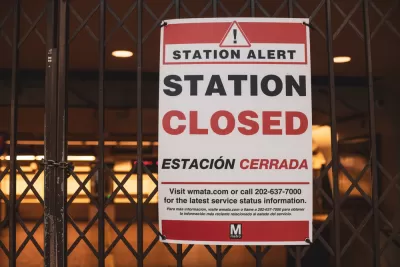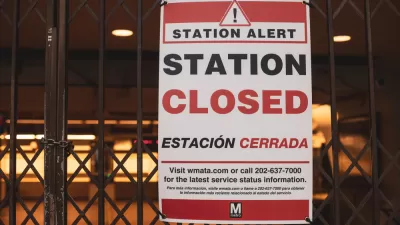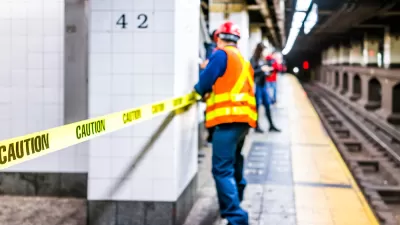The Washington Metropolitan Area Transit Authority couldn't wait for a still hypothetical bailout from Congress or the Biden administration.

The board of the Washington Metropolitan Area Transit Authority (WMATA) approved service cuts and an employee buyout plan to address the system's $176 million budget shortfall due to the coronavirus pandemic, report Justin George.
"The agency will offer retirement-eligible employees $15,000 to leave in hopes that several hundred workers will accept the incentive — part of an effort to shed 1,400 jobs," according to George. Metro's biggest employee union objected to the buyout plan, hoping the WMATA would wait until the Biden administration was in a position to deliver on promises to fund public transit.
As for the changes approved for service on the WMATA system, George offers this summary: "Among the changes that will begin around January are less-frequent train service on weekdays and the reinstatement of fares on Metrobuses."
"Service cuts will not include closing Metrorail two hours earlier, which was part of the agency’s initial plan. The agency also will not cut back on station managers or reduce the number of trains serving the Maryland suburbs. Metro decided to pull back on those proposals after receiving more than 5,000 public comments and because its financial outlook has improved since September."
The WMATA is far from alone in the fiscal crisis brought on by the coronavirus pandemic. News coverage earlier this month revealed plans for more than 9,000 layoffs and a 40 percent reduction in subway service at the New York Metropolitan Transportation Authority.
FULL STORY: Metro board approves budget cuts, buyouts as pandemic dents agency’s budget

Alabama: Trump Terminates Settlements for Black Communities Harmed By Raw Sewage
Trump deemed the landmark civil rights agreement “illegal DEI and environmental justice policy.”

Planetizen Federal Action Tracker
A weekly monitor of how Trump’s orders and actions are impacting planners and planning in America.

The 120 Year Old Tiny Home Villages That Sheltered San Francisco’s Earthquake Refugees
More than a century ago, San Francisco mobilized to house thousands of residents displaced by the 1906 earthquake. Could their strategy offer a model for the present?

In Both Crashes and Crime, Public Transportation is Far Safer than Driving
Contrary to popular assumptions, public transportation has far lower crash and crime rates than automobile travel. For safer communities, improve and encourage transit travel.

Report: Zoning Reforms Should Complement Nashville’s Ambitious Transit Plan
Without reform, restrictive zoning codes will limit the impact of the city’s planned transit expansion and could exclude some of the residents who depend on transit the most.

Judge Orders Release of Frozen IRA, IIJA Funding
The decision is a victory for environmental groups who charged that freezing funds for critical infrastructure and disaster response programs caused “real and irreparable harm” to communities.
Urban Design for Planners 1: Software Tools
This six-course series explores essential urban design concepts using open source software and equips planners with the tools they need to participate fully in the urban design process.
Planning for Universal Design
Learn the tools for implementing Universal Design in planning regulations.
Clanton & Associates, Inc.
Jessamine County Fiscal Court
Institute for Housing and Urban Development Studies (IHS)
City of Grandview
Harvard GSD Executive Education
Toledo-Lucas County Plan Commissions
Salt Lake City
NYU Wagner Graduate School of Public Service





























